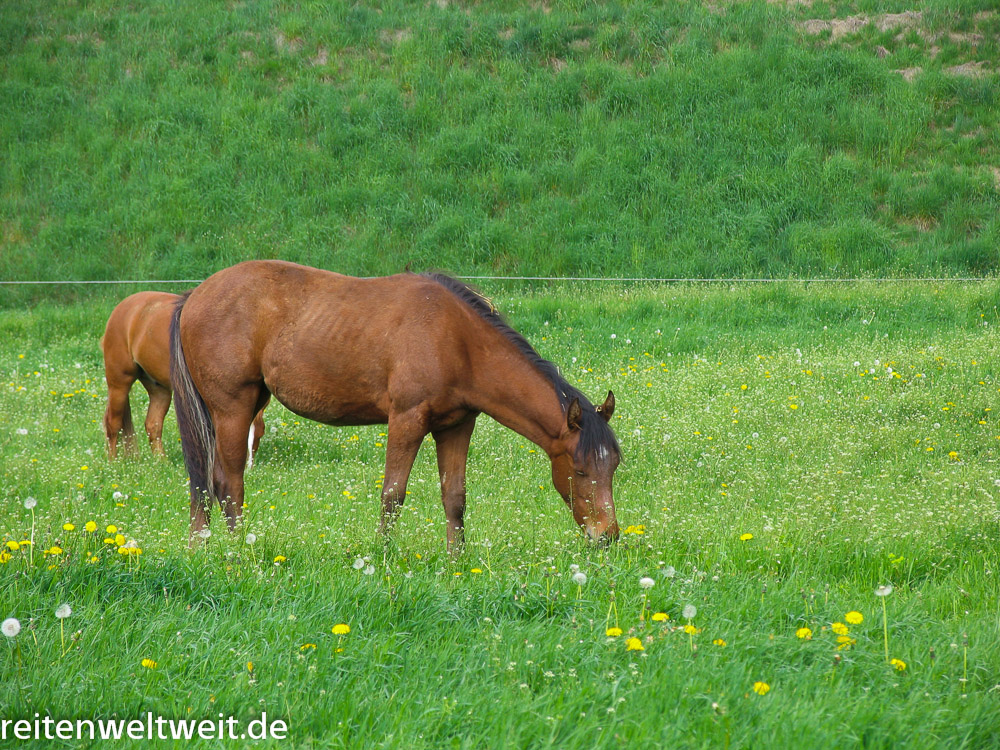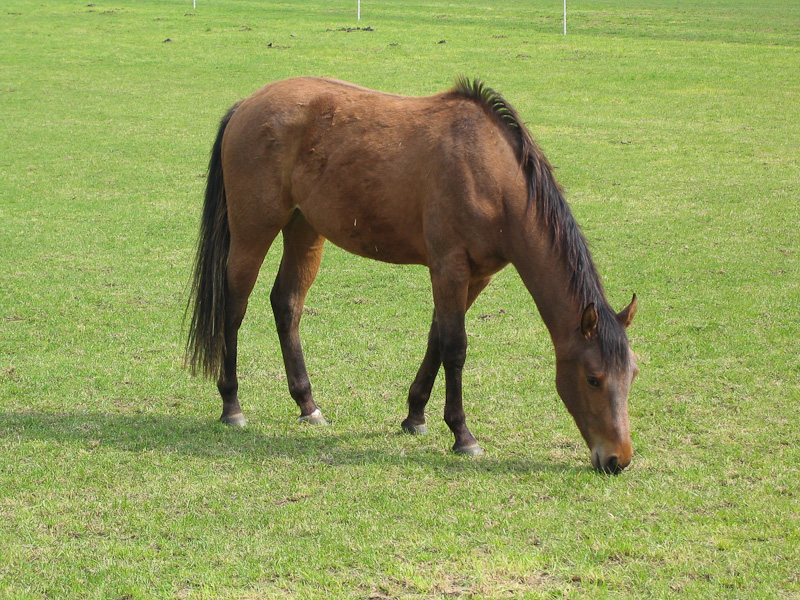Springtime means the first days on the pasture – but it needs some time to get the horses used to the grass
When you see and feel the first sunbeams you know that the spring is coming!
 After a long, cold and dark winter everyone is clearly happy about this and tries to go out to enjoy the sun and the fresh air as much as possible. There is a kind of power and vitality in the air and also horses can feel this wish to go out on the pasture. However horse owners need to be careful: during the long winter the intestinal flora of the horse changed and has to become restructured and prepared for the pasture. This process needs some time.
After a long, cold and dark winter everyone is clearly happy about this and tries to go out to enjoy the sun and the fresh air as much as possible. There is a kind of power and vitality in the air and also horses can feel this wish to go out on the pasture. However horse owners need to be careful: during the long winter the intestinal flora of the horse changed and has to become restructured and prepared for the pasture. This process needs some time.
For the digestion of the proteins and the fructans of the grass the intestine needs special bacteria.
During the winter the horse got different fodder so that these special bacteria slowly need to become reproduced. Therefore it is crucial that the horse gets used to the fresh grass very slowly because otherwise they can suffer from many different diseases. Especially colic appears really often if horses eat too much grass in a too short time. First symptoms for colic are flehming, rolling on the pasture and a general nervous behavior. Additionally the high dose of proteins can cause laminitis and has general negative effects on sweet itches. However, if your horse had the possibility also to stand outside on the pasture during the winter you will have much less problems. They are used to the grass and even ate it during periods of snow. Therefore their bacteria in their intestine are used to the grass so that they do not need to cultivate new ones.
The aspects of time and other important variables
Nowadays many pastures become fertilized. The grass which grows on these kinds of soils usually offers a much too high dose of proteins and fructan. Therefore it makes sense to plan some time to get the horse used to grass: if you do not do this your horse easily will become ill and you will have to pay a lot of additional costs for the vet. The end of April is the best time to start with the first periods of grazing. The first days the horse should not eat more than 15-20 minutes of the fresh green. It is crucial to regularly give the horse the possibility to get used to the grass. After some days of 15-20 minutes of grazing you can increment the time of grazing to half an hour and then after some further days to one whole hour. In slow steps you can increment the time. In the end the horse can graze for 8-12 hours.
 It can be really helpful if the horse keeps on his halter while grazing. Through this the horse owner has better chances to get him off the pasture again- no horse will voluntarily change the great fresh air on the pasture against the dusty air in the stable. The whole process should take two to four weeks. If there are no direct pasture possibilities at your stable you can feed three times a day fresh grass. In this case you need to make sure that the grass is fresh and was not stored for longer than 24 hours.
It can be really helpful if the horse keeps on his halter while grazing. Through this the horse owner has better chances to get him off the pasture again- no horse will voluntarily change the great fresh air on the pasture against the dusty air in the stable. The whole process should take two to four weeks. If there are no direct pasture possibilities at your stable you can feed three times a day fresh grass. In this case you need to make sure that the grass is fresh and was not stored for longer than 24 hours.
There are several other measures which help to prevent colic. Before grazing the fresh grass you can feed roughage (hay and straw). Horses which generally easily suffer from laminitis should not graze on the pasture after very cold nights. The cold inhibits the grass to grow what effects a great storing of fructan. In general we recommend to avoid grass which is longer than 15 cm because this grass contains a lot of proteins. This can effect laminitis or easily make horses fat if they eat too much of it.
To sum up: Even if it seems a bit ridiculous to take so much time to get the horse used to the pasture it is definitely worth it. In the end it prevents your horse from dangerous diseases and therefore saves a lot of money.
Surf tips:
- Did you know that anise can prevent colics?
- Horse colic – origin, symptoms, therapy
- Horses with laminitis- origin and therapy
- How to minimize the risks of Laminitis
—All statements without guarantee—


5 Comments
Comments are closed.